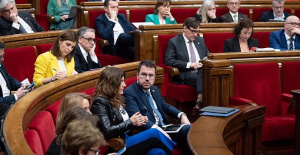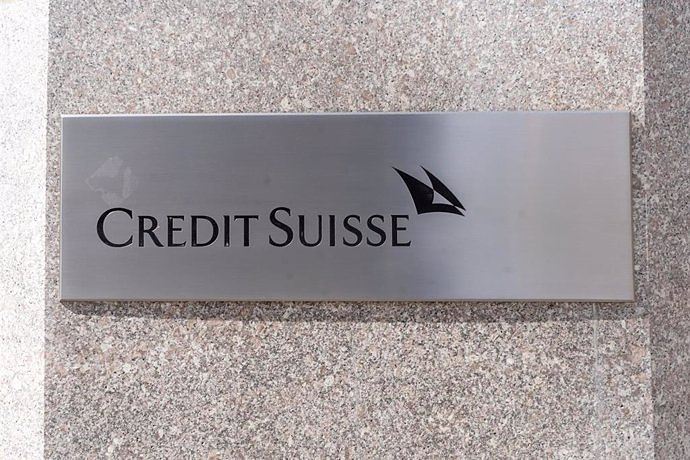He defends the actions of the Chamber and its autonomy and recalls that the Constitution guarantees the exercise of its functions "without interference"
The president of Congress, Meritxell Batet, has announced this Monday that the Chamber will abide by the decision of the Constitutional Court to paralyze the processing of the amendments for the renewal of the guarantee body itself that is now being processed in the Senate, but has defended the action of Congress during the same, has advanced that it will ask to be "heard" in the procedure to defend "parliamentary autonomy and the functions of the legislature" and has shown its "concern" for this "unprecedented" fact.
This is how Batet has pronounced himself through an institutional declaration read in Congress in which he has remarked that he has not yet received formal notification of a decision of the TC towards which he has shown his "respect".
Of course, he has remarked that the suspension of a legislative process lacks "precedents" in Spanish democracy and has shown his "deep concern" about the effects that this may have on the "functioning of the legislature", since "it makes it possible for " the interruption of the legislative power is within the reach of a single deputy with the filing of an appeal for amparo".
In addition, he has pointed out that the resolution of the TC on the very precautionary measures requested by the Popular Group occurs "in a context of blockade" of the institutions "and of frustration of the constitutional mandate to renew them", a scenario that has warned " entails the danger of a potential delegitimization of the democratic system".
The president stressed that Congress "conducts its operation based on loyalty to all the powers of the State and trust in all its institutions" and "is always guided by loyal compliance with the Regulations and the Constitution."
"The Congress of Deputies, in order to exercise its powers, interprets the Constitution and frames its action in its possible sense, although in our constitutional system the last word rests with the Constitutional Court," added Batet.
He then stressed that the TC's decision has the effect of "suspending a legislative procedure in progress, a fact that is unprecedented in the history of constitutional jurisdiction."
ONLY ONE REPRESENTATIVE CAN STOP A LAW
"With the decision known today, it is possible for the interruption of the exercise of legislative power to be within the reach of a single deputy when filing an appeal for amparo. This change in the way of proceeding followed to date produces deep concern, from the point of view of view of the proper functioning of the legislative power and the exercise of its constitutional powers", Batet has warned.
And it has abounded: "In the framework of the understandings on the relations between the Cortes Generales and the Constitutional Court in the last forty years, the possibility of a suspensive action of the exercise of a basic constitutional function in a democracy had not been experienced or contemplated as is the parliamentary debate and the legislative power, recognized in article 66 of the Constitution".
In this context, it has highlighted that the "Supreme Norm", through different provisions, "guarantees and preserves the process of free formation of the will of the legislative bodies through debate, deliberation and voting. Without interference" and that this "is a principle that has always governed, until now, the coexistence of our model of constitutional justice with the exercise of popular sovereignty through the functions attributed to the Cortes Generales".
At this point, Batet has remarked that "the action of the Congress of Deputies can only be one: that of compliance with the decision of the Constitutional Court." Although he has said that he hopes that "as soon as possible" the Chamber hopes to be "heard" and to be able to present before the TC his "arguments to defend parliamentary autonomy and the functions of the legislative power."

 Exploring Cardano: Inner Workings and Advantages of this Cryptocurrency
Exploring Cardano: Inner Workings and Advantages of this Cryptocurrency Seville.- Economy.- Innova.- STSA inaugurates its new painting and sealing hangar in San Pablo, for 18 million
Seville.- Economy.- Innova.- STSA inaugurates its new painting and sealing hangar in San Pablo, for 18 million Innova.- More than 300 volunteers join the Andalucía Compromiso Digital network in one month to facilitate access to ICT
Innova.- More than 300 volunteers join the Andalucía Compromiso Digital network in one month to facilitate access to ICT Innova.-AMP.- Ayesa acquires 51% of Sadiel, which will create new technological engineering products and expand markets
Innova.-AMP.- Ayesa acquires 51% of Sadiel, which will create new technological engineering products and expand markets Mulino, dolphin of former President Martinelli, wins the presidential elections in Panama
Mulino, dolphin of former President Martinelli, wins the presidential elections in Panama The prosecutor who asked to investigate the complaint of Ayuso's partner against two prosecutors for revealing secrets is removed
The prosecutor who asked to investigate the complaint of Ayuso's partner against two prosecutors for revealing secrets is removed The PSC would win the Catalan elections with between 40 and 42 seats, followed by Junts (35-37) and ERC (21-23)
The PSC would win the Catalan elections with between 40 and 42 seats, followed by Junts (35-37) and ERC (21-23) The Israeli Army asks Palestinians to leave Rafah "immediately" in the face of an imminent offensive
The Israeli Army asks Palestinians to leave Rafah "immediately" in the face of an imminent offensive How Blockchain in being used to shape the future
How Blockchain in being used to shape the future Not just BTC and ETH: Here Are Some More Interesting Coins Worth Focusing on
Not just BTC and ETH: Here Are Some More Interesting Coins Worth Focusing on A sensor system obtains the fingerprint of essential oils and detects if they have been adulterated
A sensor system obtains the fingerprint of essential oils and detects if they have been adulterated Faraday UPV presents the 'Origin' rocket to exceed 10 km of flight: "It is the beginning of the journey to space"
Faraday UPV presents the 'Origin' rocket to exceed 10 km of flight: "It is the beginning of the journey to space" The Generalitat calls for aid worth 4 million to promote innovation projects in municipalities
The Generalitat calls for aid worth 4 million to promote innovation projects in municipalities UPV students design an app that helps improve the ventilation of homes in the face of high temperatures
UPV students design an app that helps improve the ventilation of homes in the face of high temperatures A million people demonstrate in France against Macron's pension reform
A million people demonstrate in France against Macron's pension reform Russia launches several missiles against "critical infrastructure" in the city of Zaporizhia
Russia launches several missiles against "critical infrastructure" in the city of Zaporizhia A "procession" remembers the dead of the Calabria shipwreck as bodies continue to wash up on the shore
A "procession" remembers the dead of the Calabria shipwreck as bodies continue to wash up on the shore Prison sentences handed down for three prominent Hong Kong pro-democracy activists
Prison sentences handed down for three prominent Hong Kong pro-democracy activists ETH continues to leave trading platforms, Ethereum balance on exchanges lowest in 3 years
ETH continues to leave trading platforms, Ethereum balance on exchanges lowest in 3 years Investors invest $450 million in Consensys, Ethereum incubator now valued at $7 billion
Investors invest $450 million in Consensys, Ethereum incubator now valued at $7 billion Alchemy Integrates Ethereum L2 Product Starknet to Enhance Web3 Scalability at a Price 100x Lower Than L1 Fees
Alchemy Integrates Ethereum L2 Product Starknet to Enhance Web3 Scalability at a Price 100x Lower Than L1 Fees Mining Report: Bitcoin's Electricity Consumption Declines by 25% in Q1 2022
Mining Report: Bitcoin's Electricity Consumption Declines by 25% in Q1 2022 Oil-to-Bitcoin Mining Firm Crusoe Energy Systems Raised $505 Million
Oil-to-Bitcoin Mining Firm Crusoe Energy Systems Raised $505 Million Microbt reveals the latest Bitcoin mining rigs -- Machines produce up to 126 TH/s with custom 5nm chip design
Microbt reveals the latest Bitcoin mining rigs -- Machines produce up to 126 TH/s with custom 5nm chip design Bitcoin's Mining Difficulty Hits a Lifetime High, With More Than 90% of BTC Supply Issued
Bitcoin's Mining Difficulty Hits a Lifetime High, With More Than 90% of BTC Supply Issued The Biggest Movers are Near, EOS, and RUNE during Friday's Selloff
The Biggest Movers are Near, EOS, and RUNE during Friday's Selloff Global Markets Spooked by a Hawkish Fed and Covid, Stocks and Crypto Gain After Musk Buys Twitter
Global Markets Spooked by a Hawkish Fed and Covid, Stocks and Crypto Gain After Musk Buys Twitter Bitso to offset carbon emissions from the Trading Platform's ERC20, ETH, and BTC Transactions
Bitso to offset carbon emissions from the Trading Platform's ERC20, ETH, and BTC Transactions Draftkings Announces 2022 College Hoops NFT Selection for March Madness
Draftkings Announces 2022 College Hoops NFT Selection for March Madness




























